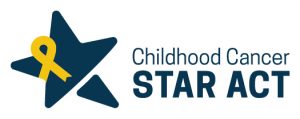Community News: Update on Federal Childhood Cancer Appropriations Process
Update from our colleagues at the Alliance for Childhood Cancer (July 13, 2020):
The House Appropriations Committee agreed to fully fund the Childhood Cancer STAR Act and the Childhood Cancer Data Initiative again this year. Notably, the Senate has historically championed our cause for STAR funding, so this development in the House shows an even stronger commitment from Congress for our research priorities.

This step is important to our requests being included in the final appropriations package when Congress considers the next budget.
Here are some key sections related to childhood cancer:
STAR Act – The Committee includes no less than $25,000,000, the same as the fiscal year 2020 enacted level, for continued implementation of sections of the Childhood Cancer Survivorship, Treatment, Access, and Research (STAR) Act to expand existing biorepositories for childhood cancer patients enrolled in NCI-sponsored clinical trials to collect and maintain relevant clinical, biological, and demographic information on children, adolescents, and young adults, with an emphasis on selected cancer subtypes (and their recurrences) for which current treatments are least effective. Funding provided this year will allow NCI to continue to conduct and support childhood cancer survivorship research as authorized in the STAR Act.
Childhood Cancer Data Initiative (CCDI) – The Committee includes $50,000,000 for the second year of the CCDI, as proposed in the fiscal year 2021 budget request. The development of new therapies is important to finding a cure for childhood cancers, many of which have not seen new therapies in decades.
Childhood Cancer Survival Metrics – A recent study determined that childhood cancer diagnoses are on the rise by approximately 0.8 percent per year. Worldwide, there are 400,000 new childhood cancer diagnoses annually. However, childhood cancer death rates are described as being on the decline. The Committee is concerned that the current metric used to determine mortality and survival statistics for childhood cancer does not fully capture the long-term morbidity and mortality of these diseases. Currently, a child or adult that lives five years from the date of diagnosis is considered a survivor. Yet, children are not small adults and their potential life span after diagnosis is much longer than an adult. Using the five-year survival metric does not capture children who die prematurely as a result of their cancer or its treatment when they are past the five-year point. The Committee directs NCI to establish a task force composed of childhood cancer researchers and advocates to determine the most appropriate survivorship metric for childhood cancer. In addition, the Committee recognizes a critical goal of the CCDI is to collect comprehensive data about every child diagnosed with cancer in the U.S., including data on survival and mortality, such as death due to late effects of cancer and its treatment. The Committee requests an update from NCI in the fiscal year 2022 Congressional Justification focusing on how CCDI efforts will address this need to more accurately capture childhood cancer mortality beyond the current five-year survival metric.
Pediatric Brain Cancer – The Committee recognizes that brain cancer remains the most fatal of all pediatric cancers. Despite progress in other diseases, pediatric brain cancer survival rates have not improved for decades and have lagged behind the strides made in other cancers. The majority of children who survive may experience lifelong impairments and disabilities that result from high levels of toxicity associated with treatment. The committee strongly encourages NIH to expand funding on research on pediatric brain cancer, including but not limited to drug delivery methods and new therapies with reduced levels of toxicity and long-term complications.
Pediatric Research – The Committee requests an update from the Director within 120 days of enactment of this Act on how NIH will focus on the unique needs of children in its NIH-wide initiatives that span multiple Institutes and Centers, as well as its highest priority initiatives, including but not limited to the All of Us Research Program and the Cancer Moonshot. The Committee asks that with respect to these major NIH initiatives, this update describe the inclusion of pediatric subjects, research relevant to pediatrics, specific funding allocations, support for pediatric physician scientists, and a strategy to more proportionally target funds within these initiatives to pediatric research. The Committee commends NIH for the establishment of the Trans-NIH Pediatric Research Consortium to help coordinate pediatric research at NIH. The Committee also requests an update in the fiscal year 2022 Congressional Justification on the activities of the Consortium and its plans to better coordinate pediatric research across the institutes, including identifying gaps and opportunities for collaboration.
Categories
- Blog Posts (117)
- Explainer Post (12)
- Guest Blogs (30)
- Member Blogs (42)
- Survivorship Matters Blog (9)
- CAC2 News (23)
- Collaborative Achievements (15)
- Community News (274)
- In Memoriam (2)
- News Digest (223)
- Webinars (64)